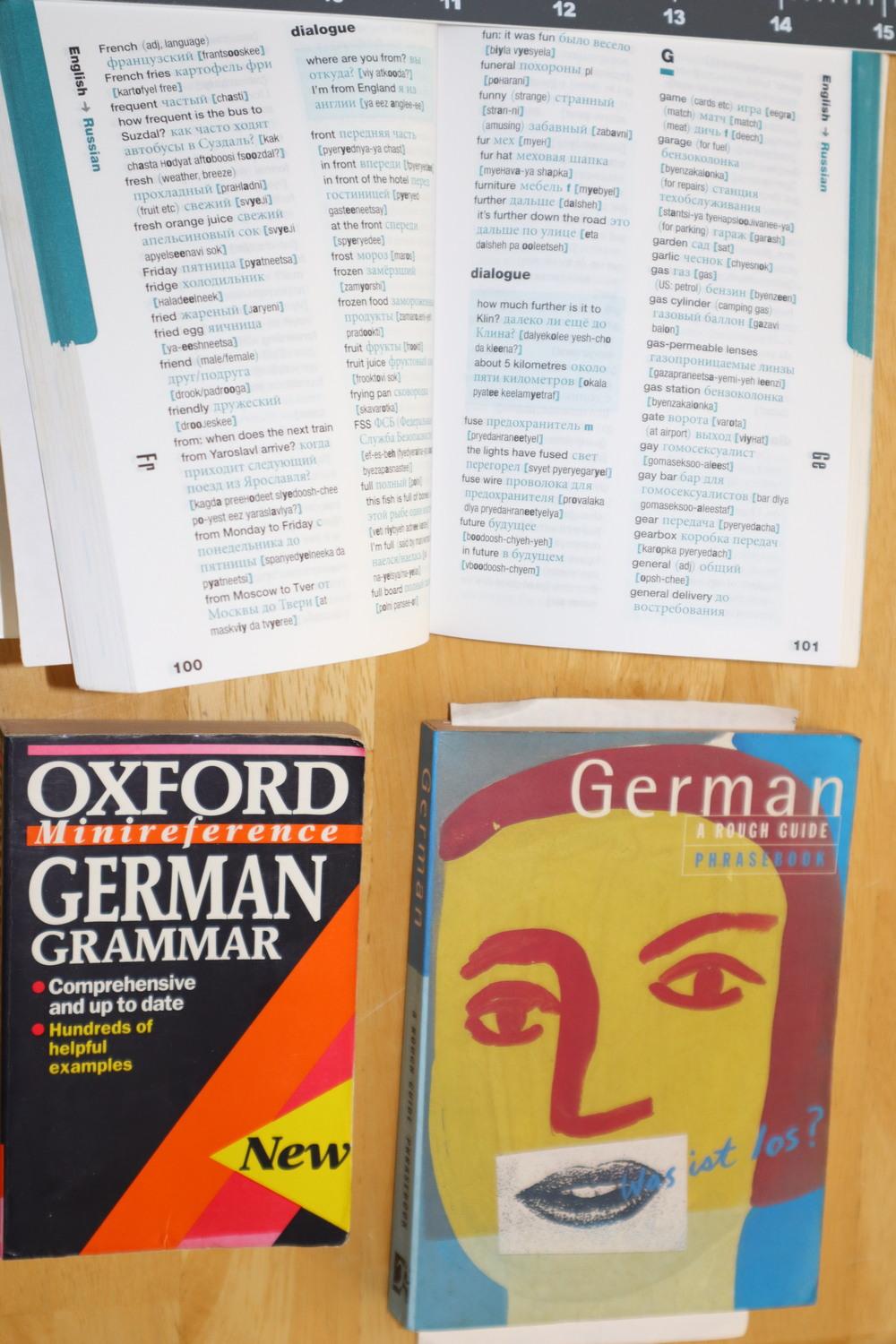How To Learn A Foreign Language - Part 1
:date: 2023-05-06 13:30 :tags:
For a native English speaker, I've had a decent amount of experience conversing with people who don't speak English. I've done job interviews in Switzerland and been to family gatherings in Argentina where English was not an option. When people realize this, I'm often asked how I came to speak German and Spanish. Well, it was certainly not my high school foreign language education. In a bizarre side note, my French teacher subsequently sued the school district for making her work with children! Can't make this up!

I actually had to stop taking French after two years because it was so damaging to my academic record. The way language is taught in high school (in the USA) provides a wonderful insight into how exactly not to teach a foreign language. Keep that in mind: the normal way language is taught is terrible.
Obviously the best way to learn a language is to have your parents and everyone around them speak it all the time from the moment you are conceived. The next best thing and the best way to acquire additional languages is to learn it as a child. Now I get it — you are probably old and missed that window of opportunity. The reason to reflect on this is to ask ourselves what do children have that adults don't have?
The relevant answer is that kids are less bothered about fantastically weird situations. Imagine if I told you I was taking you to the mall and was going to ask you to sit on some guy's lap and tell him what you want; he'll be wearing a bright red suit and a false beard. Kids can accept such crazy weird stuff way more easily than adults. And that's what you have to do to your mind. A foreign language is deeply crazy and weird. You just have to go with it.
This implies that wanting to translate everything back into English in real time is bad. If you think you are a translation computer you will be terrible at it. You will not be able to do it fast enough to think about what is being said. And this incorrect literal translation approach is exactly what high school tries to get you to do. It does not work. Certainly there are moments where you think "sombrero = hat" but you're trying to get to the stage kids get to where sombrero and hat and fedora and beret are things worn on the head. It's just another thing you know. And like "helmet" might have the context of two wheeled vehicles, "sombrero" has the context of Mexico.
Ok, that's all well and good, but what is a better way to learn? My method is to first get serious. Are you truly serious about learning FL (the particular foreign language you are interested in)? Ask yourself why would you do that? It's a hard thing to do and will require a lot of work. For me, I knew I wanted to spend time in Switzerland and learning the language was a part of my rather serious tourism agenda. An even better stronger motivation is the one I had for learning Spanish: there were girls I wanted to talk to who only spoke that language. It's also reasonable to have a hobby that's connected to the language. For example, I once learned enough Italian to read some opera libretti fairly well.
Ok, so you're pretty sure you're serious. Now what? I start with two small books. The first is the "Rough Guide Phrasebook" series. The second is the "Oxford Grammar Minireference" series. At first glance these are terrible books that would impart the worst elements of high school pedagogy. But you have to think differently — remember everything is weird and crazy.

I actually do not like phrasebooks in general and consider them mostly unhelpful. If you were a computer, maybe they could be useful but you're not and you'll forget pretty much everything in them. So why should you read this phrasebook first? And when I say "read" I mean every word on every page cover to cover. The answer is that this particular book (there may be others that work fine too) has a transliteration of the foreign text into not just English, but phonetic characters that when read the way a normal English speaker reads will come out sounding like FL. This is extremely helpful if you really do not know how the language is pronounced. If you are in danger of saying "cuh-wee-sah-dill-ah" when ordering a quesadilla, you will find this exercise extremely valuable. Of course if you spent a lot of your childhood in California and Texas, you might be able to skip it for Spanish. I thought that for Italian but even there it was helpful to burn into my head the few quirky pronunciation rules (why is it "peet-sah" and not "peez-zah"?) in an otherwise uncomplicated language. But for German with its weird characters and weird pronunciation, it was extremely helpful. After reading this entire book (aloud if possible) using the English speaking cues, how to read German aloud was no longer a challenge. I could get it generally right pretty much every time. Let me emphasize, do not memorize anything from this book. You want to read it quickly and with a relaxed mind. There will be no test on this! Just zip through it and you will be able to look at any text from that language and have a basically correct idea of what that sounds like. Thankfully I've not come across a language as inscrutable and lawless when it comes to pronouncing written text correctly as English.
If the language involves some seriously different character sets like the Russian shown, you'll probably want to read this book multiple times for this exact purpose of learning to simply read aloud. Because of reading this Russian book, I am pretty capable of reading Cyrillic text if given enough time to look at it. I don't understand it! But I can read it. That's an important start.
Hopefully you can now read text that you do not understand but that speakers of FL will. Then you move on to the Oxford mini grammar. When you read the phrasebook hopefully you were finding it kind of interesting from time to time. (E.g. "Oh, despite official reports to the contrary, they do have the concept of gay bar in Russian." and "Hmm, looks like droog from A Clockwork Orange is just literally Russian for friend." etc.) It's just not possible to memorize all of that. And in my opinion unrealistic to memorize any of it. But after reading that phrasebook, you will have had a good sampling of the vocabulary. You'll know what it's like and be more likely to recognize a legitimate word you don't know as being part of that language. The idea with the Oxford mini reference is to do the exact same thing but for the grammar.
Just start at page one and quickly read through the entire book. Cover to cover. Don't skip around. Don't test yourself or practice. Just read the whole book as if it didn't really matter what you learned. You'll probably worry that you completely forgot everything and that is kind of true. But memorizing all of this is not the mission. Books never transfer data into a brain like a USB drive. You should imagine reading this book exactly as I describe and then feeling that you can not recall a single thing. You'd definitely get an F on any test about any of it. What could possibly be the value then?
By going through this exercise you will learn the scope of the FL. If there are rules in FL that are not in that book, you absolutely will never need to worry about them. Ever.
But what happens with a real attempt to learn beginner FL is that the sentences are painfully simple. You're encouraged to go out and find some real examples of FL in your hobby or whatever and practice with those. Unfortunately the organic language did not read your beginner books and is not holding back complex constructions that are planned for the end of your four years of study. Having read the FL grammar book — the smallest and easiest one possible as quickly and stress-free as possible — you will have an appreciation for all the crazy stuff you can expect to see. You will read organic FL text and see many things that still remain absolutely incomprehensible, but which you kind of know are legit FL. You recognize it as probably real FL versus complete made up gibberish which, before reading this little book, you couldn't do.
What's so useful about this is if you keep seeing over and over again a kind of construction in the kinds of text your hobby produces, you can dig into that and study that — for actual comprehension this time — sooner rather than later. For example, maybe your mission involves a lot of travel in places where they speak FL and you realize that you need to get a much better handle on time syntax, especially departure times and so on. You might vaguely remember that the time discussion in the grammar book did seem overly complicated and, well, foreign, but now you realize that you really care about this topic, so later in your studies you can go back and study it more carefully.
If you read these two books for your FL, you're really now at the starting line. It's like an athletic event and by reading these books, you've put in the training. The event (of actually properly learning FL) will now go much smoother. How to proceed to actually learning it? Any of the normal ways will be fine. I went on to read text books cover to cover. But I also did as much watching TV as possible with the subtitles on. Listening to music and studying the lyrics is incredibly helpful (and the main reason I don't feel a bit bad for making the rest of the world learn English). Read websites and watch Youtube in FL. Change language settings in software. Find a game server where the chat is in FL. Some people like live classes and talking to real people. Go for it. With the preparation outlined above, any reasonable strategy is even more reasonable.
Obviously if you can travel to where FL is spoken that will profoundly increase the seriousness of the learning. Having a boy/girlfriend who is a native FL speaker is ironically not a great way if they speak English; if they don't, it is hands down the best way. The problem with many fancy people you'll meet in the FL capital is that they often speak really good English and this derails your learning program quite badly. They are actually eager to practice the English they studied in school for 15 years. I always enjoyed riding my bike in the Swiss Alps as high as I could go until I found some remote farmers for whom speaking impeccable English to tourists was not a daily occurrence.
That's my general strategy for learning a language. I've also discovered some other specific tips. For example, I have found it's absolutely critical to learn the alphabet in FL. You'll be in an airport terminal with 26 gates and they'll say "ee-sex" and you'll go to E6 only to find that it's really I6. It is also very helpful to have people spell words for you. Often you would know what they said if it were written down but they might be, say, Austrian and their accent is very strange (I learned in Switzerland so what I call Echtdeutsch, real German, is actually also weird for me but the spelling is the same).
Consider this advice: If you're helping a foreign speaker learn English, the first word you should teach them is "duck". A fancy European can talk about the difference between goose and duck down in puffy jackets in perfect English. What I'm talking about is when someone yells at you the one word command "Duck!". They do not teach that to German kids. You can make yourself useful by filling in those gaps. "Heads up" is an other WTF for even very proficient foreign speakers that they should memorize immediately. Now that you know this, consider teaching it to FL speakers and then immediately asking about corresponding topics you ought to learn.
My next tip is controversial but so am I: Always ignore the formal form. You're not going to meet the Kaiser. Even in job interviews the people I talked to understood what a strange thing it was for someone who spoke native English to be speaking to them in bad but slightly Swiss accented "German". They will understand that you paid your respects by learning their bloody language. So if they have two completely redundant ways to conjugate verbs - ignore one completely. You could go the formal only route, but I find that's even more confusing and it doesn't help have the kinds of honest exchanges with the locals you may want as a tourist. If you're learning for business purposes, the formal may make more sense.
My final rule is the most important one: Do not stress! This is absolutely critical. If you stress, you will fail. As elementary school kids pass into middle school and beyond, their ability to stress goes up and their ability to learn a language shrivels and dies. My tactic was aggressive in fighting this. I thought about my Swiss friends and how their astonishingly good English was occasionally peppered with fun quirky ways to say things that were perfectly understandable but were alien enough to be charming and thought-provoking. I wanted to go one better so I told people in Switzerland that my goal was to be hilarious with my misspoken "German" and they were encouraged to laugh at it as if it were a comedy act. Then I was free to aggressively just say whatever crazy nonsense that came to my head. And it turns out that if you talk like that enough - which is exactly what toddlers do - you start to have sensible conversations and people forget that you can't speak their language worth a damn.
I'm writing about this topic today because I finally am fed up with listening to so much incomprehensible Bokmaal in my daily life. I watch a lot of Nordic skiing and Bokmaal is how nerdy Norwegian people say "Norwegian" apparently — normal ones say norsk. What I've written about here is my classic technique for learning a foreign language, but like Nordic skiing, there is a newer technique. The classic way is still valid and useful to know about, but I'm trying out a more modern approach. I will write about that in Part 2.
